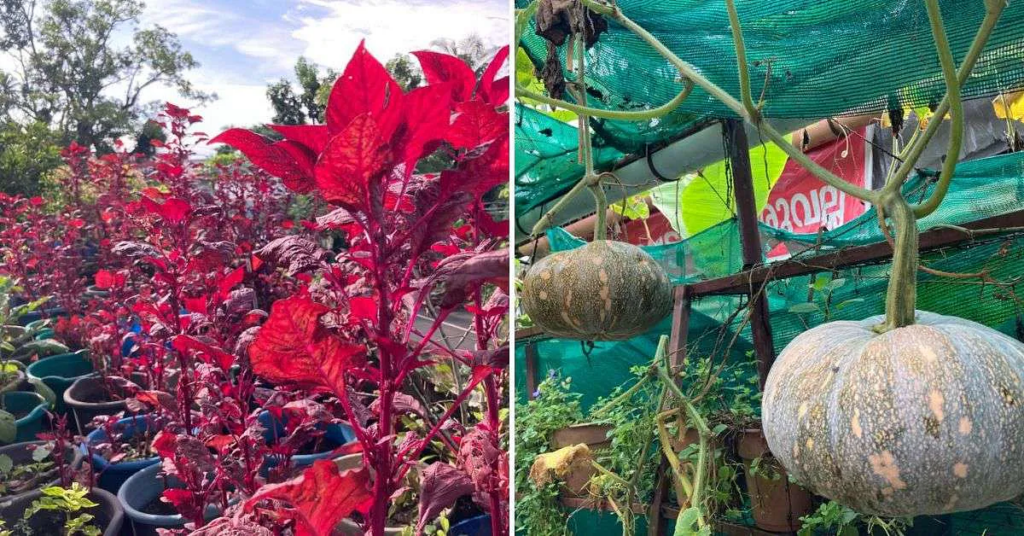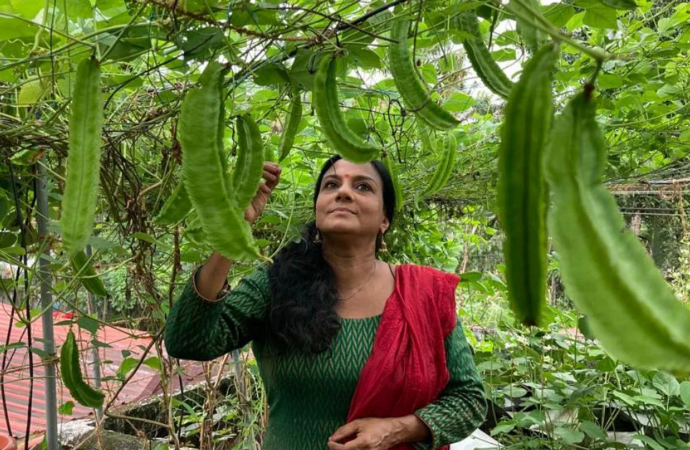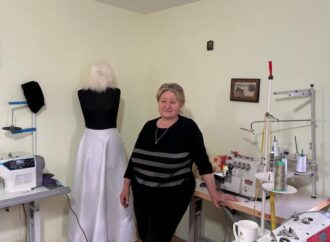Want to turn your organic terrace garden into a business? Here’s how
Kerala’s Rema Devi earns a neat income from seeds, plants, and biofertilizers in her home garden.
It was in the late 90s that Rema Devi started organic farming around her house premises in Changanassery town in Kottayam, Kerala.
It started as a small venture to meet her daily requirements. But over the years, it has grown into something bigger, earning her a decent monthly income.
She grew up assisting her grandmother, who according to Rema was an amazing organic farmer.
She literally grew everything required for the entire family be it pulses, vegetables or fruits, we had everything organic and fresh. My younger sister and I used to be her assistants.
Therefore, I believe it was her influence and of course, the experience I gained that helped me excel in organic farming.
Rema devi
Over the last 20 years, she has been growing a variety of vegetables and fruit trees on the terrace and surroundings of her two homes.
Eventually, Rema started her own YouTube channel with the intention to guide others to take up organic farming. She also began making quality seeds out of vegetables and selling them.
“Terrace gardening can be done in the most sustainable way without many expenses. I try to teach my viewers how to maintain a garden efficiently through my channel,” says the 56-year-old.
Chemical-free vegetables for the family
Rema, who pursued her higher studies in Botany says, “I have an emotional attachment to farming as it reminds me of my childhood and my grandmother. Though I couldn’t pursue a job after studies, I am glad that I could do what I love the most.”
When my children were young. I bought a snake gourd from the market and stir-fried it. But I was shocked to smell some kind of chemicals from it. That’s when I took the decision to grow clean vegetables for my children.
Recalls Rema
Ever since she has been organically growing all the vegetables for her family in her home garden.
Initially, she started farming in the space around her home, which was built on 13 cents of land. Later when one more house was built on the same land, Rema moved her farm to both terraces, which came to around 2,500 sq ft.
According to her, though it seems easier to nurture a terrace garden than grow on land, there are certain things that need to be taken care of.
“While maintaining a terrace garden one needs to remember that it’s the top layer of our house. We need to ensure safety. So, I painted my entire terrace with white cement to avoid water leakage. And to avoid keeping pots and grow bags directly on the terrace, I used coconut shells instead of expensive stands” she says.
Rema started her farming venture with spinach and cowpeas as her family loved these two vegetables. I kept adding more to my collection, and now I have different varieties of almost all the vegetables including the local veggies and seasonal ones
Among the vegetables she grows are different varieties of chillies, okra, brinjal, tomatoes, spinach, peas, gourds, onion, air potatoes, beans, cucumber, broccoli, cauliflower, carrot, radish, cabbage, and lettuce.

Other than vegetables, she also grows a few fruit trees like papaya, Malabar plum, rambutan, guava, custard apple, sapota, and different varieties of lemon.
In addition to growing fresh vegetables for her family, Rema saves their seeds too.
“Since I grow more than enough for my family, the rest have been used for making seeds,” she says.
The seeds are sold through social media farming groups. She also sells them to those who contact her on WhatsApp.
“The seeds are priced between Rs 25 and Rs 40 a packet, depending on the variety and availability. Currently, I make around Rs 60,000 per month, just through seeds,” says Rema who has been getting orders from across the state.
Formulating homemade fertilisers and pesticides
Gardening should never be an expensive affair.
She gives out tips and tricks on her YouTube channel — Rema’s Terrace Garden — where she shares how to maintain a cost-efficient and sustainable terrace garden and makes organic fertilisers and pesticides using kitchen waste.
She says, “I don’t waste anything from my kitchen. All bio-waste like egg shells, onion peels, coffee or tea grounds, and even items like buttermilk, curd, rice water, coconut milk etc can be made into organic fertilisers. Even fish waste can be used for the same purpose.”
Over the last two decades, I have been able to make different types of organic fertilisers and pesticides using easily available ingredients. Now I am trying to help others through my YouTube channel.
says the YouTuber
She shares one such organic fertiliser she formulated, which is loved by many on her channel.
“Mix some cow dung, cow urine, neem cake, groundnut cake, and green leaves together, and keep it aside for 10 days. Then add 100 gm of lime powder to the mix, and let it sit again for five more days. You can dissolve this mixture in a 1:10 ratio with water. It makes a very good bio-slurry which can be applied to all kinds of plants.”
According to Rema, everyone should grow at least a few vegetables on their own in their houses.
More than growing clean vegetables on your own, there is a kind of happiness and satisfaction that comes with it. You would never know it unless you attempt this
she says


























Leave a Comment
Your email address will not be published. Required fields are marked with *